|
|
|
Sort Order |
|
|
|
Items / Page
|
|
|
|
|
|
|
| Srl | Item |
| 1 |
ID:
094760
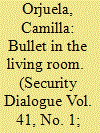

|
|
|
|
|
| Publication |
2010.
|
| Summary/Abstract |
This article investigates the security-development nexus through a study of local experiences in a neighbourhood in Sri Lanka's capital Colombo. As the Sri Lankan state struggles to secure 'the nation' from 'terrorism', and to develop it towards a twin vision of modernization and return to a glorious past, large parts of the population in Colombo 15 remain at the margins of this 'nation'. They are ethnic and religious minorities, forgotten tsunami victims, terrorist suspects and unauthorized dwellers - those often depicted as threats to, rather than subjects of, 'security' and 'development'. This study reveals that the security-development nexus constitutes a complex web of linkages between factors related to housing, income, tsunami reconstruction, party politics, crime, political violence and counter-violence, social relations, and religious beliefs and rituals. People's perceptions of and opportunities to pursue security/development are intimately linked to their position as dominant or marginalized within 'the nation', 'the community' and 'the family'. 'Security' and 'development' issues are mutually reinforcing at times, but just as often undermine each other, forcing people to make tough choices between different types of security/development.
|
|
|
|
|
|
|
|
|
|
|
|
|
|
|
|
| 2 |
ID:
067757
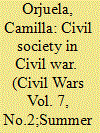

|
|
|
| 3 |
ID:
133425
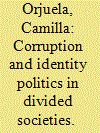

|
|
|
|
|
| Publication |
2014.
|
| Summary/Abstract |
Corruption is a major problem for populations in various parts of the world. This article argues that to understand the problems and dynamics of corruption, we need to understand how discourses and practices of corruption (and anti-corruption efforts) are intertwined with the construction and contestations of identity. Identity politics is a salient feature in peaceful political struggles, as well as in contemporary armed conflicts, which are often characterised by the politicisation of collective identity (ethnic, national, religious) for the violent pursuit of power. The article outlines and discusses four ways in which identity politics and corruption intersect. First, it points to the often blurred lines between private and collective benefit from corruption, revealing the implications of group identity for how corruption is conceptualised. Second, it shows how corruption may exacerbate grievances along identity lines. Third, it highlights how corruption can be used strategically in identity-based conflicts. Finally, it explores how corruption may encourage cross-ethnic solidarity and mobilisation that defy conflict divides.
|
|
|
|
|
|
|
|
|
|
|
|
|
|
|
|
| 4 |
ID:
134287
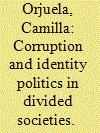

|
|
|
|
|
| Publication |
2014.
|
| Summary/Abstract |
Corruption is a major problem for populations in various parts of the world. This article argues that to understand the problems and dynamics of corruption, we need to understand how discourses and practices of corruption (and anti-corruption efforts) are intertwined with the construction and contestations of identity. Identity politics is a salient feature in peaceful political struggles, as well as in contemporary armed conflicts, which are often characterised by the politicisation of collective identity (ethnic, national, religious) for the violent pursuit of power. The article outlines and discusses four ways in which identity politics and corruption intersect. First, it points to the often blurred lines between private and collective benefit from corruption, revealing the implications of group identity for how corruption is conceptualised. Second, it shows how corruption may exacerbate grievances along identity lines. Third, it highlights how corruption can be used strategically in identity-based conflicts. Finally, it explores how corruption may encourage cross-ethnic solidarity and mobilisation that defy conflict divides.
|
|
|
|
|
|
|
|
|
|
|
|
|
|
|
|
| 5 |
ID:
133423
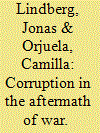

|
|
|
|
|
| Summary/Abstract |
'Corruption in the aftermath of war' brings together an interdisciplinary group of scholars to enquire into the dynamics of corruption in post-conflict societies. This introduction discusses five themes, problematising and summarising key findings from the 10 articles included. First, we discuss the problems with the corruption concept, related to its moralising connotations and definitional vagueness, and propose viewing corruption as a collective action dilemma as a way of avoiding these moralising aspects. Second, we discuss post-conflict societies, and highlight the great varieties of 'peace' that that label can refer to. We suggest that the causes, dynamics and effects of corruption in post-conflict societies bear many similarities with those in other societies, but that the post-conflict situation often generates an intensification and entrenchment of corruption-related problems. Third, we analyse the dynamics between international interveners and domestic actors, and show the contradictions and tensions in international-domestic relations. Fourth, we argue that the inter-linkages between inequality, mistrust and corruption deserve consideration in the study of post-conflict societies, and that inequality in particular merits more attention. Finally, we discuss some methodological challenges encountered by the contributors in their studies of corruption in post-conflict societies.
|
|
|
|
|
|
|
|
|
|
|
|
|
|
|
|
| 6 |
ID:
173910
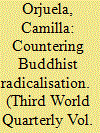

|
|
|
|
|
| Summary/Abstract |
Violence and hate speech endorsed by Buddhist monks against Muslim minorities in South and Southeast Asia have attracted global attention in recent years, and been the focus for a growing academic scholarship. This article turns the attention to peace activists, religious – including Buddhist – leaders and other civil society actors seeking to counter anti-Muslim agitation in Myanmar and Sri Lanka. Drawing on theories about social movements and countermovements, it analyses the diverse counter-forces, their activities and the obstacles they face. Doing so, the article contributes to an understanding of peacebuilding in religiously framed conflicts, and of the conditions for peace movements in an age of radicalisation and online activism. Based on interviews with civil society representatives and religious leaders, complemented with secondary sources, the study finds that although the peace movements are weaker and largely reactive to and restrained by the radical Buddhist nationalist movements, they constitute important counter-voices. The article also argues that the struggle between hate speech and counter speech in social media constitutes an important part of the movement–countermovement dynamics. Finally, the article suggests that theories on opposing movements can usefully be developed to enhance our understanding of mobilisation in different arenas in conflict-affected societies.
|
|
|
|
|
|
|
|
|
|
|
|
|
|
|
|
| 7 |
ID:
110238
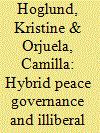

|
|
|
|
|
| Publication |
2012.
|
| Summary/Abstract |
This article analyzes hybrid peace governance and illiberal peacebuilding in postwar Sri Lanka. While discussing the kind of hybridity that has emerged, it focuses specifically on the international/domestic nexus by exploring the interplay between international intervention and domestic politics of peace governance and public mobilization. The analysis demonstrates that there are social and political divides that support the hybrid structures of peace governance. These are not merely between local and international actors; but there is also a sharp division within the international community. In this way, illiberal international powers have been gaining influence and have contributed to shaping the situation domestically. Illiberal politics are particularly justified through mobilization against the liberal peacebuilding interventions of other international powers.
|
|
|
|
|
|
|
|
|
|
|
|
|
|
|
|
| 8 |
ID:
164508
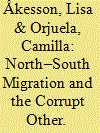

|
|
|
|
|
| Summary/Abstract |
Global discourses and measures to combat corruption have often built on and reinforced the image of a dichotomy between the supposedly non-corrupt European Self and the underdeveloped, corrupt Other. This article unsettles this binary by looking at practices and discourses of corruption among Portuguese migrants to Angola. Recently, the economic crisis in southern Europe pushed thousands of Portuguese citizens to migrate to Portugal’s former colony in search of economic security and opportunities. Building on 55 in-depth interviews with Portuguese migrants and their Angolan work colleagues, the article shows how in Angola, the Portuguese encountered a society marred by both high-level and petty corruption. However, the migrants were affected by and engaged in corruption in very different ways, depending on their socio-economic situation. Non-elite migrants, and particularly the undocumented, were susceptible to corruption as they struggled to complete their paperwork, make a living and support families back home. Migrants involved in big business were often closely allied with the Angolan elite and engaged in bribery and other forms of corruption in their profit-making ventures. The article also discusses identity construction in this postcolonial context. It finds that a persistent image of the former colonial masters as ‘civilizers’ and ‘more developed’ coexists with the new Portuguese position of subordination and vulnerability in relation to the unpredictable and corrupt Angolan party-state. Anti-corruption is, however, not part of a new Portuguese civilizing mission – rather the similarities and continuity between Portugal and Angola is emphasized, and corruption is described as a shared problem.
|
|
|
|
|
|
|
|
|
|
|
|
|
|
|
|
| 9 |
ID:
082244
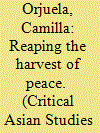

|
|
|
|
|
| Publication |
2008.
|
| Summary/Abstract |
When the Sri Lankan government and the Liberation Tigers of Tamil Eelam (LTTE) entered into a peace process in 2002, the term "peace dividend" was often used, both in and outside the peace negotiations. The need to reconstruct and normalize war-torn areas was identified as a shared interest between the parties. It was believed that if ordinary people could reap the harvest of peace through improved living conditions, they would also support the peace process. Curiously, the link between a peace dividend and popular support for peace was never critically scrutinized. This article argues that far from being a "neutral" shared interest of the two parties, reconstruction of the war-affected areas was high-voltage politics, intimately interlinked with security and political structures. Both the LTTE and the government wanted to control and use reconstruction efforts to "win the hearts and minds" of the people. While the political struggle for control over reconstruction was fought at the elite level, grassroots people in the war zone - the supposed beneficiaries of a peace dividend - were engaged in their own everyday life struggles and had concerns that were quite different from those brought up by their self-proclaimed spokespersons. Villagers interviewed in northern Sri Lanka, for example, had few expectations of outside assistance. Their support for the peace process was not conditional upon visible, material benefits. An end to violence was sufficient inducement for them. And thus, the idea advanced by donors, diplomats, and peace negotiators that reconstruction was needed to build support for the peace process, proved to be more rhetoric than substance.
|
|
|
|
|
|
|
|
|
|
|
|
|
|
|
|
| 10 |
ID:
167248
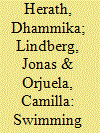

|
|
|
|
|
| Summary/Abstract |
Corruption is endemic, pervasive and embedded in the very fabric in social life in some societies, although its degree varies case to case. Previous academic research and anti-corruption watchdogs have examined corruption in Sri Lanka, where corruption is perceived to be pervasive and endemic but, existing studies are inadequate to explain why corruption occurs and anti-corruption continues to fail in Sri Lanka. In our study, we use the contrasting perspectives of ‘collective action problem’ and the ‘principal-agent’ framework to analyse the dynamics that cause and maintain corruption in Sri Lanka as well as the obstacles and possibilities that people fighting corruption are experiencing. We address this aim in a novel way: our observations and fieldwork in Sri Lanka got us in contact with individuals who made concerted efforts to reveal and oppose corruption at different levels; we call them ‘corruption fighters’. We argue, through the insights from corruption fighters, that corruption represents a ‘collective action problem’ and that to understand why corruption fighters still choose to oppose it, they need to be situated within a discourse of corruption and close attention must be paid to personal motivations and the way they construct meaning in the fight against corruption.
|
|
|
|
|
|
|
|
|
|
|
|
|
|
|
|
| 11 |
ID:
117569
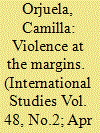

|
|
|
|
|
| Publication |
2011.
|
| Summary/Abstract |
This article explores the global dimensions of violent conflict and the parallels and links between violence in the diaspora and the homeland. It does so by discussing Tamil street gangs in London, Toronto and Paris. The Tamil diaspora played a key role in the war between the Sri Lankan government and the Liberation Tigers of Tamil Eelam (LTTE), which raged between 1983 and 2009. In spite of being a marginal phenomenon in the Tamil diaspora, Tamil street gangs became part of a wider culture of fear within the Tamil community and possibly reinforced the LTTE's dominance over and fundraising in the diaspora. Although some of the rivalling gangs have been cast as pro- and anti-LTTE, gang violence cannot be interpreted as a direct continuation of conflict from Sri Lanka but has to be understood in relation to marginalization and identification in the city of residence. In everyday life in the diaspora, 'the gang' has been a way for some young Tamil men to strive for respect, riches and heroism, employing a mixture of references to gang culture and the LTTE and building on both ethnic and geographical identifications. The larger Tamil community, on its part, has been eager to dissociate itself from the street gangs as they threaten the image of the Tamils as law-abiding and well-adjusted migrants.
|
|
|
|
|
|
|
|
|
|
|
|
|
|
|
|
|
|
|
|
|